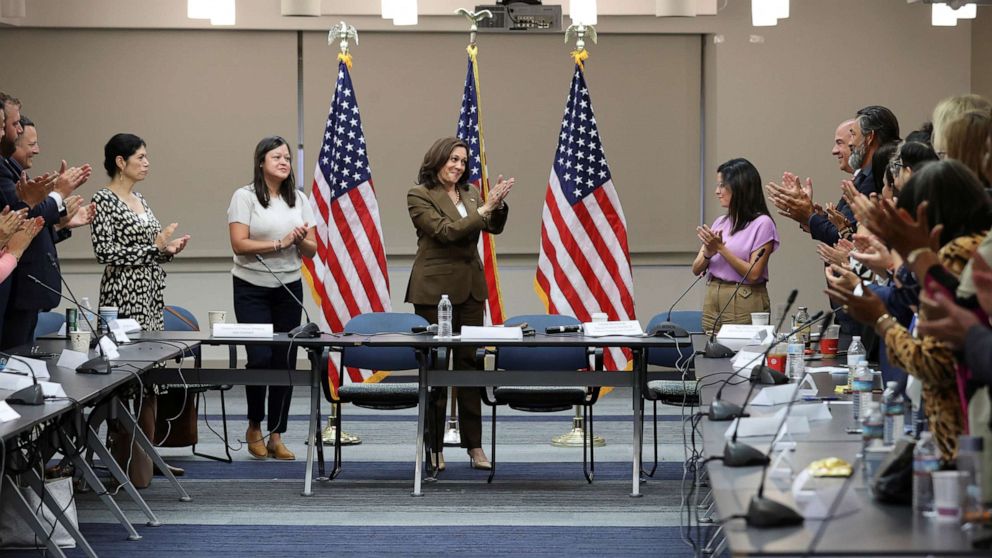Texas Democrats pressure Congress to block state-GOP voting restrictions
Texas Democrats spent Tuesday in Washington pressuring Congress to pass federal voting rights legislation and calling for an exception to the Senate's filibuster rule blocking Democrats from moving forward with a measure they say would stop GOP-led efforts to restrict voting in Texas and nationwide.
They met with Vice President Kamala Harris Tuesday evening.
"I know what you have done comes with great sacrifice, both personal and political," she said according to a note from a reporter covering the meeting as part of a pool. "Defending the right of the American people to vote is as American as apple pie."
She went on to set their efforts in the "context of history," listing Frederick Douglass' 1867 appeal to Congress for the right for Black men to vote, women marching down Pennsylvania Avenue in 1913 for the right to vote and passage of the Voting Rights Act in 1965.
"This is not an issue about Democrats or Republicans. This is about Americans and how Americans are experiencing this issue," she said.
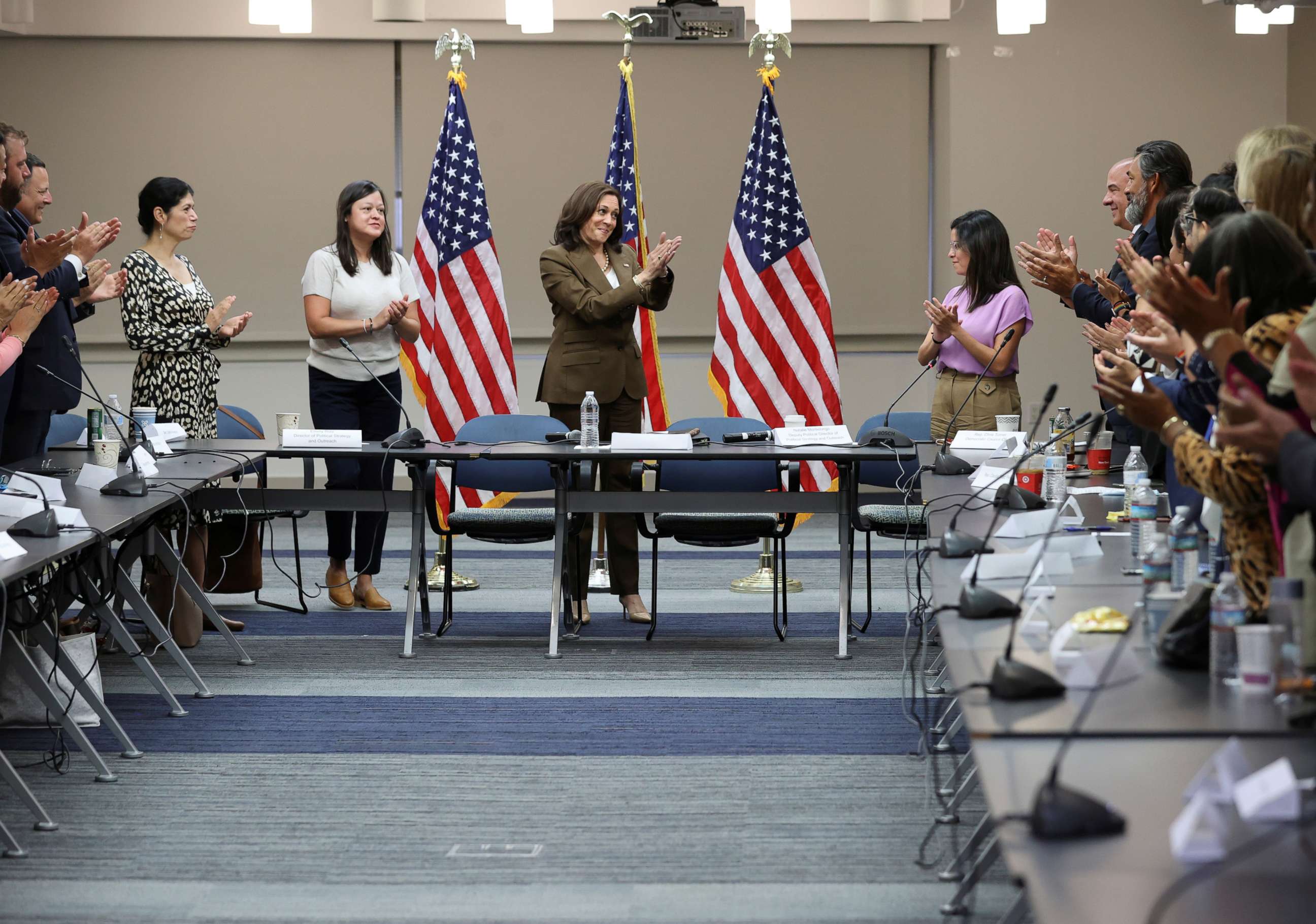
The state lawmakers were expected to meet with a key Democrat who has resisted changing the filibuster rule requiring 60 votes to advance legislation -- West Virginia Sen. Joe Manchin. He and Arizona Democrat Sen. Kyrsten Sinema are playing a pivotal role in the ongoing congressional negotiations over a national voting rights bill.
It is unclear if the Texas Democrats will hold meetings with Sinema. If both she and Manchin were to agree to an exception to the rule -- Senate Democrats with their 50 votes, along with the vice president -- could pass the bill congressional Democrats and President Joe Biden have made a top priority.
Biden made his case in a high-profile speech in Philadelphia Tuesday afternoon.
"There is an unfolding assault taking place in America today, an attempt to suppress and subvert the right to vote in fair and free elections, an assault on democracy, an assault on liberty, an assault on who we are as Americans," Biden said.
"We're going to face another test in 2022, a new wave of voter suppression and raw and sustained election subversion. We have to prepare now," the president said.
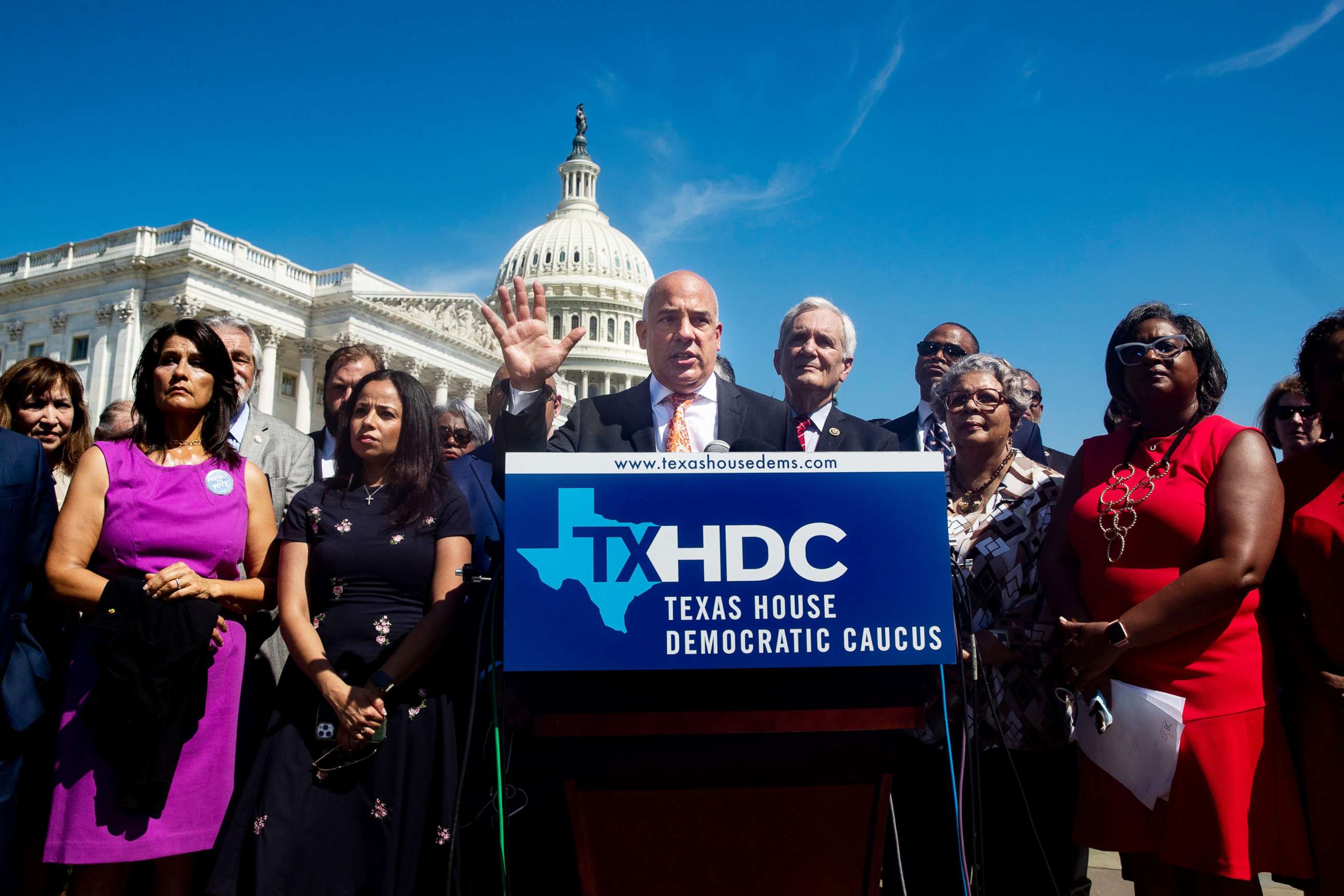
"If you can have a carve-out for a right-wing Supreme Court justice, why can't you have a carve-out to protect the very fundamentals of our democracy?" State Rep. Chris Turner said at a Capitol Hill news conference, referring to making an exception to the filibuster for voting rights.
"If Mitch McConnell did a carve-out for Amy Coney Barrett, then we ought to do a carve-out for the black and brown people that live in Texas, Georgia, Florida, that live in all these states trying to make it harder for our constituents to exercise their right to vote," State Rep. Marc Veasey added. "Time is of the essence. We cannot wait. States are going to start to ramp up these efforts."
More than 50 Texas House Democrats fled the state Monday evening, depriving the state legislature of a quorum, and must now remain out of Texas for the duration of the ongoing special legislative session, which ends on Aug. 6.
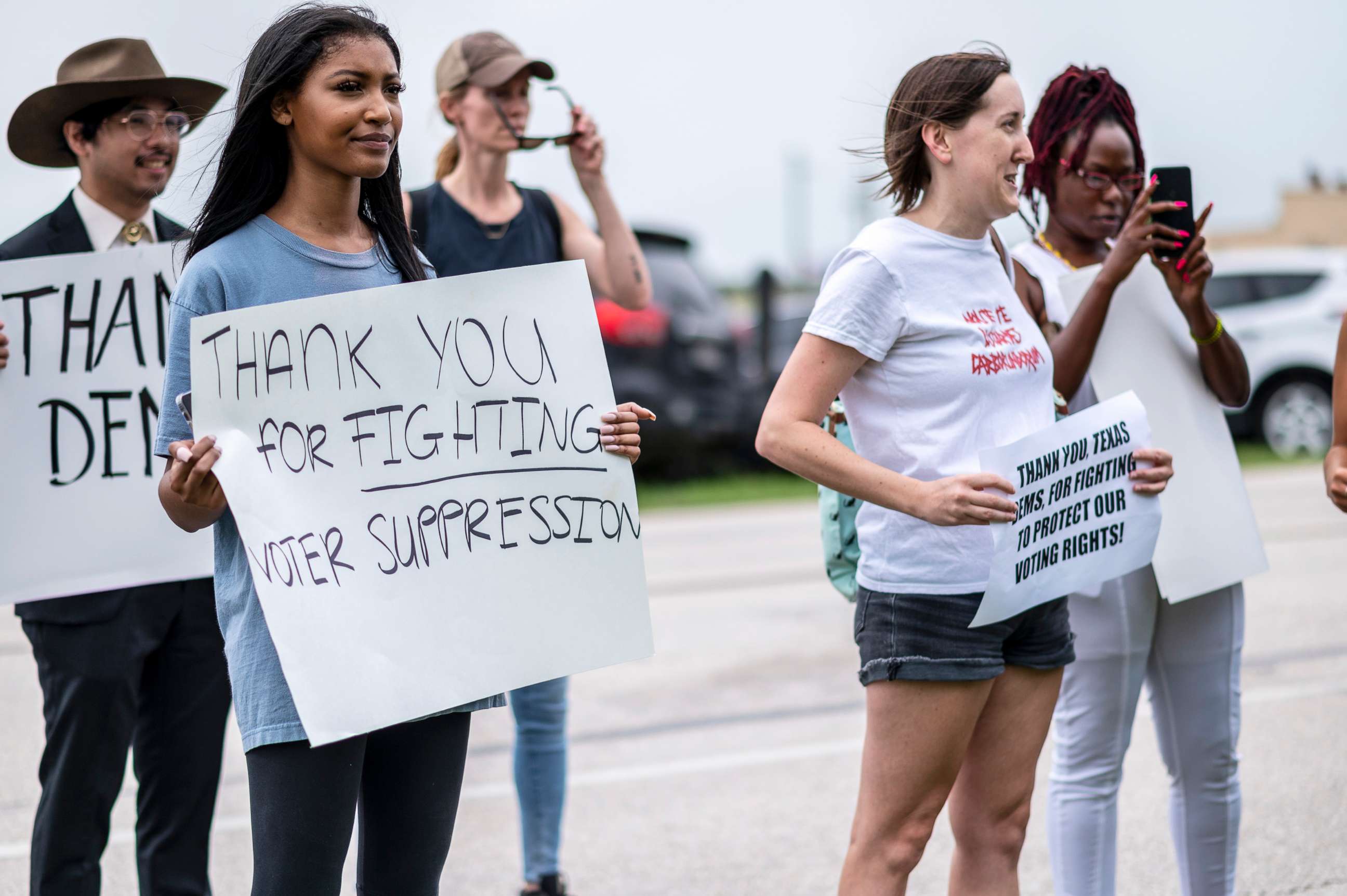
In their absence from the Austin state capitol on Tuesday, a majority of Republican House lawmakers passed a procedural measure that allows authorities to go out and find the absent Democrat House members.
Texas law authorities may even utilize arrest warrants in their efforts to compel the lawmakers back, if such action is deemed necessary. However, it remains unclear whether this order can affect the Democrats while they are out of state and outside of the jurisdiction of Texas law enforcement.
At a Tuesday afternoon press conference in Austin, House GOP Chair Jim Murphy further described the procedural move -- called a "call to House" -- that not only allows Texas authorities to seek out the absent Democrats, but also puts in place the requirement for all entrances out of the chamber to be locked to prevent anyone from leaving without permission from the speaker.
"Make no mistake, this is not about one particular bill. This is political theater, by and for Texas Democrats. As legislators, it's our duty to show up and do the people's work. These Democrats have walked off the job twice now and abandoned their obligation to represent you," said Murphy.
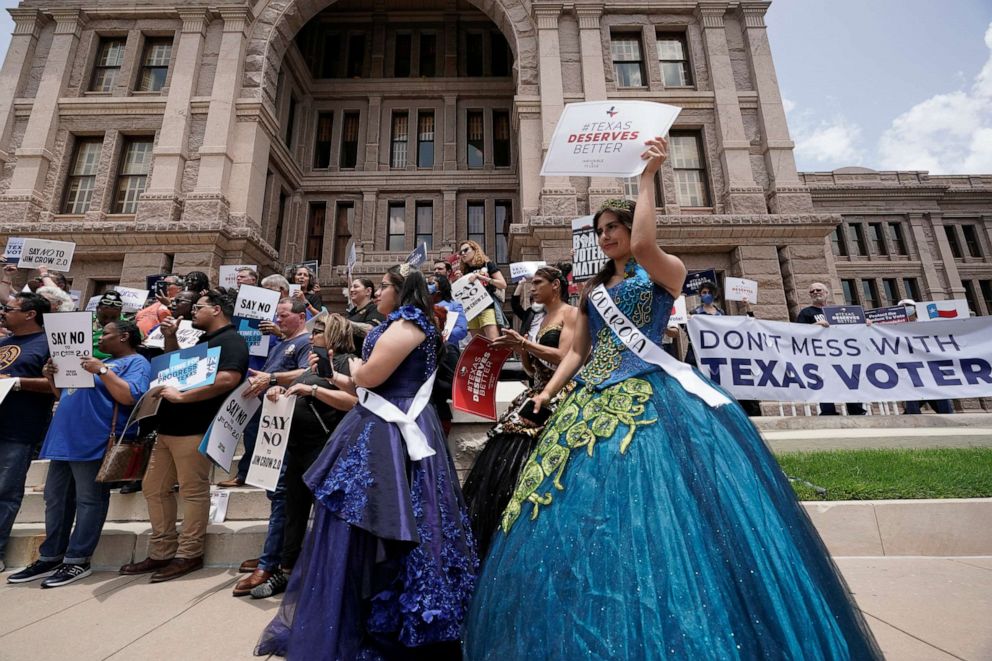
The state's Democratic legislators pointed to the spread of what they called former President Donald Trump’s "big lie" that falsely asserts his claim of winning the 2020 election as a partial catalyst for their decision to leave their home state.
"We are not going to buckle to the ‘big lie’ in the state of Texas -- the 'big lie' that has resulted in anti-democratic legislation throughout the United States,” Mexican American Legislative Caucus Chair Rafael Anchía said.
Texas House Dean Senfronia Thompson echoed Anchia’s comments and put a spotlight on the impact revisions to voting access in her state would have on people of color.
"I'm not here to take a vacation in Washington, D.C. When I looked at the African American Museum, I thought about the struggle my people fought in this country to get the right to vote. And that right is sacred to my constituents that I represent in Houston, Texas, and I'm up here because I don't plan to be a sitting person in that legislature," Thompson said.
Seventeen states had enacted 28 new laws that restrict access to the vote, as of June 21, according to the Brennan Center for Justice. The latest versions of Republican-backed legislation aimed at revising Texas voting and election laws included several provisions that voting rights advocates say would detrimentally affect the abilities of people of color to vote.
Among them are provisions that appear to be aimed at practices utilized by Democrat-leaning Harris County during the 2020 election. Both bills ban 24-hour voting availability, which offered greater ballot access to Houston-area shift workers when implemented in the fall. Each of the proposals coming from the Republican majorities in the Texas House and Senate also aim to end drive-thru voting, another popular voting method in the diverse county.
Additionally, the dual bills included provisions that granted expanded access to partisan poll watchers, which voting rights advocates decried for potentially opening the door to in-person voter intimidation.
On Monday, Texas Democrats did not indicate specific plans for what they aim to do after the special session ends. They also did not directly offer insight into whether they intend to continue breaking quorum going forward, given that GOP Gov. Abbott has the power to call for as many special legislative sessions as he wants.
"We know that's exactly what he's going to do, we went in his eyes wide open,” Texas House Democratic Chair Turner told reporters.
"Our intent is to stay out and kill this bill this session, and use the intervening time -- I think 24 or 25 days now -- before the other session to implore the folks in this building behind us to pass federal voting rights legislation to protect voters in Texas and across the country," he added.
Vice President Harris will meet sometime this week with the Texas legislators, according to an official in Harris' office.
ABC News' Molly Nagle, Benjamin Siegel and Libby Cathey contributed to this report.
